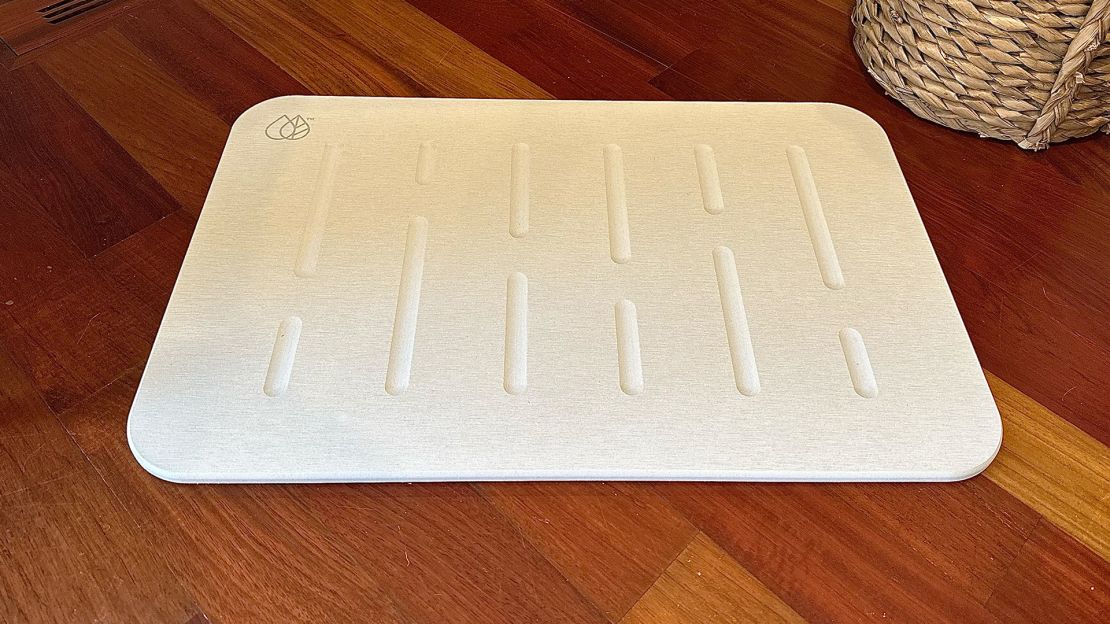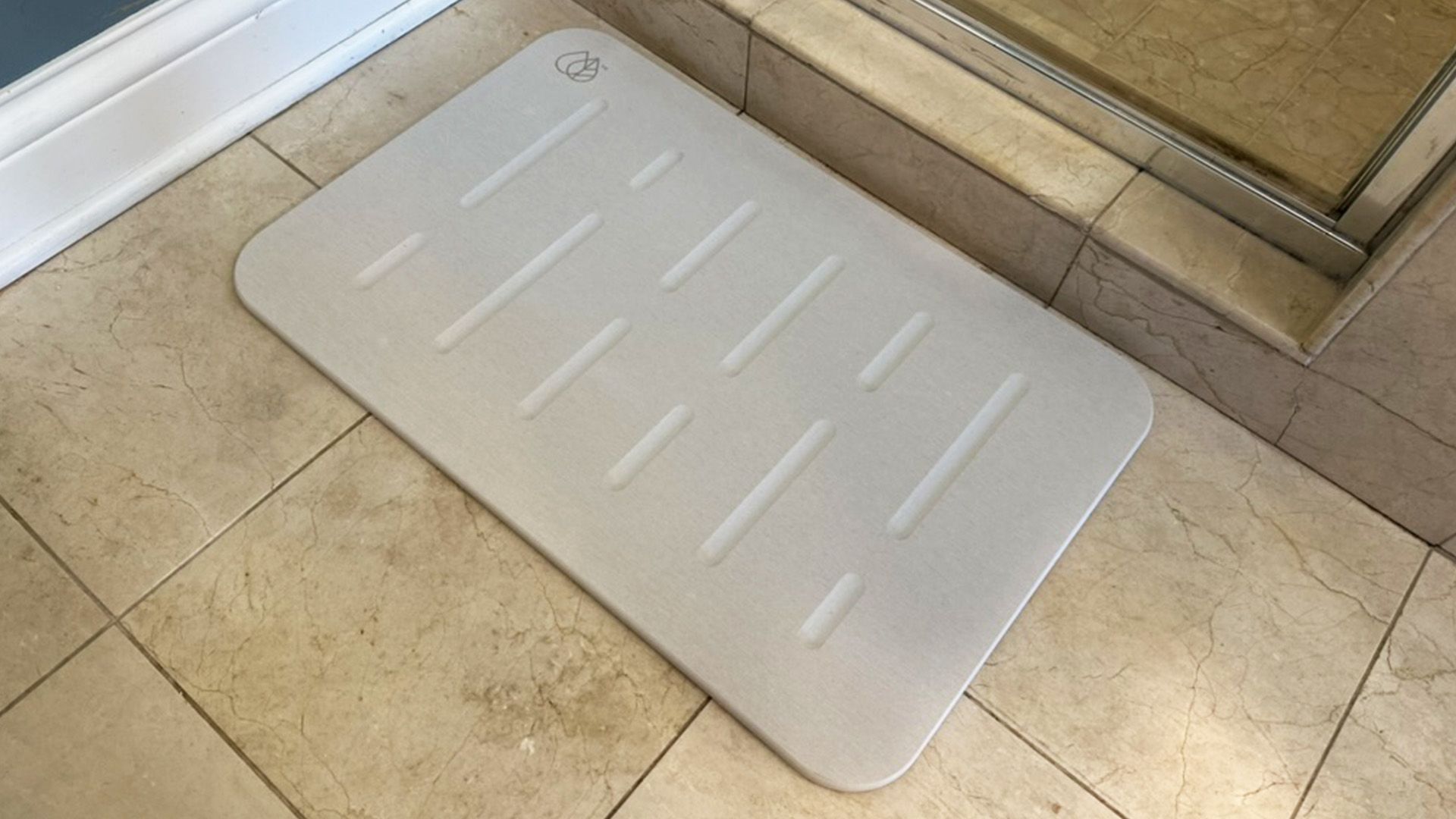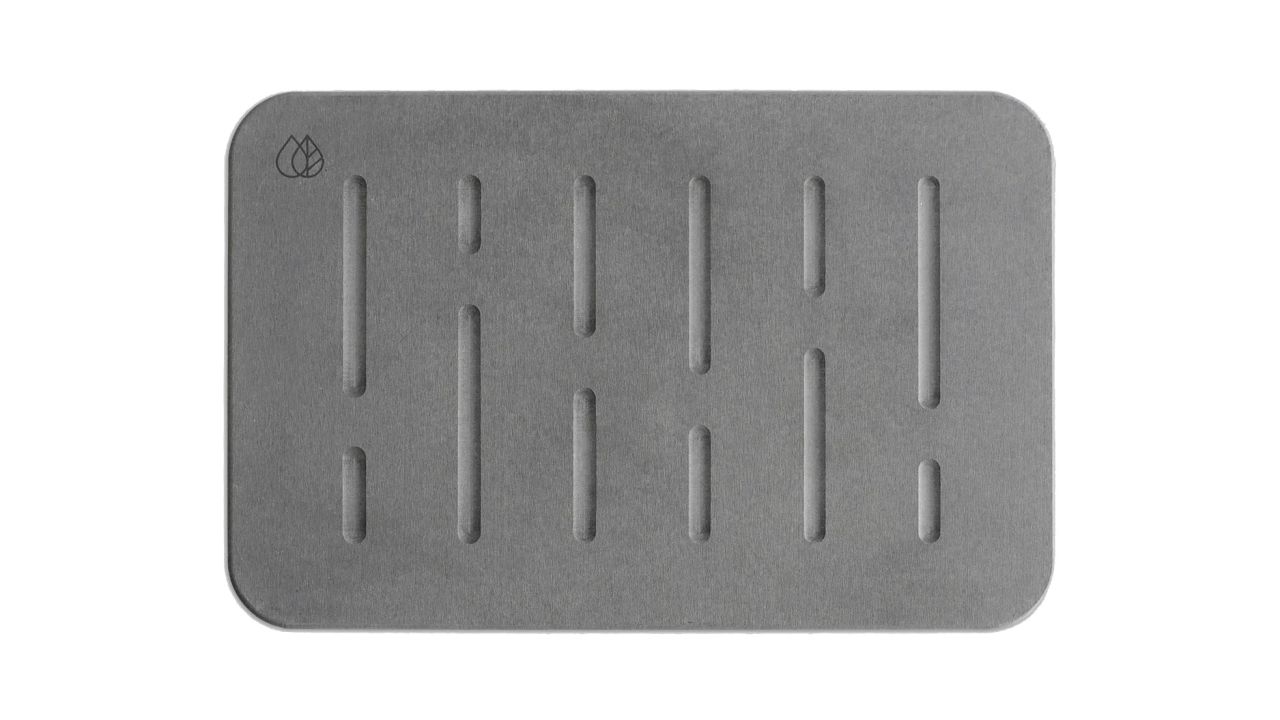It’s not often you come across a new trend in bath mats — they’re one of those home items that doesn’t seem to evolve significantly as the years pass. But it’s safe to say that diatomaceous earth stone bath mats have become a recent bathroom decor darling, especially among those interested in sustainable living products.
The minimalist slabs present a wholly different option from the ubiquitous plush, shag, terry, tufted and even wooden alternatives. But it’s not just the look that has captured so many people’s attention: Diatomaceous earth mats are touted as a sustainable swap made from minerals that are naturally antimicrobial, thanks to their ability to wick away moisture almost immediately. While countless brands have popped up as stone bath mats increased in popularity, I was particularly keen to try Dorai Home, a company that’s been making stylish bath stone mats since 2018 following a successful Kickstarter campaign while abiding by rigorous safety standards.
I got my hands on a Dorai bath mat, and after weeks of testing, I’m officially never going back.
This stone bath mat is perfect for people looking for sustainable swaps or even those who want an upgrade from their boring (and possibly mildewy) old bath mat.?
What is diatomaceous earth?
Traditional fabric bath mats are frequently made from synthetic materials like polyester and microfiber, can grow mold and mildew when waterlogged and rarely maintain their soft feel for very long. Diatomaceous earth, meanwhile, is a naturally occurring mineral composed of diatoms, or tiny fossilized algae skeletons. The sandlike substance is mined from the earth near bodies of water and used as everything from chemical-free pesticides to pool filters and even toothpaste (the latter using “Food Grade,” purified diatomaceous earth).
But in the past few years, it’s become increasingly popular in stone form — especially for bath mats. That’s because, when diatomaceous earth is compressed into a slab, it maintains its porosity and (to an extent) its antimicrobial properties. Water quickly evaporates from the surface, keeping bacterial growth at bay.
What we liked about it
As soon as I opened the (completely plastic-free) packaging, I was enamored. The look of the Dorai Bath Stone Mat is far more minimalist and classy than any other bath rugs I’ve had in the past. Dorai’s low-profile stone and simple design (whether you go with the Rain or Zen pattern) is reminiscent of a high-end spa or hotel, which is a nice boost in my otherwise pretty dated bathroom.

I wasn’t sure if I’d like the feeling of the hard surface as much as I liked the look, though. My previous bath mat was made with memory foam, which I chose specifically because of its plushness. But in this case, I was pleasantly surprised; the stone actually feels nice and clean under my feet, and it isn’t cold like tile.
But most importantly, the mat really does what the company says it does: It wicks away water almost instantly. The dark footprints and water spots become incredibly faint within seconds, and are typically completely gone by 30 minutes or so after a shower. Puddles never collect on the surface, and the water that is there doesn’t impact how the stone feels under your feet, unlike when water collects on a fabric mat. I especially appreciate this as someone who shares a bathroom. My husband and I are both morning showerers, and I never loved the feeling of an already wet bath mat when I got the second slot in the morning procession. With the quick-drying abilities of the Dorai mat, that’s not a concern anymore.
The stone is about as easy to clean as Dorai promises too. The bath mat comes with a small, round piece of sandpaper; if there’s a mark — whether it’s a light scratch or even a stain — you just sand it ever so gently until the mark is gone. For more persistent stains, you can use a bit of hydrogen peroxide or chlorine bleach, per the website; I did use the former on one small spot of blood after I nicked myself shaving, and it did the trick (along with a bit of sanding).
What we didn’t like
There’s not a whole lot to say here, frankly. The Dorai bath mat comes with a rubberized pad that you place beneath the stone; this not only helps with draining and keeping it in place, but it also helps prevent breaking. That’s all great, but I have found that my stone tends to shift a bit on top, leaving the pad ever so slightly exposed. It’s not a deal breaker by any means, but rather a slight annoyance.
The bath mat comes in only two colors — Slate and Sandstone — so if you’re looking for something more bold, you won’t find it here. I chose the Sandstone because it better complements the warm color scheme of my towels. I do like the look, but I will say it shows every piece of dirt or hair (my husband and I are both brunettes) that falls to the floor. I’ve taken to vacuuming even more frequently to get rid of it. The light color also means any slight mark is bound to show, though the sanding takes care of it.

Dorai’s bath mat is also quite a bit smaller than what I had before, at 23.6 inches by 15.4 inches compared to my old mat, which was about 34 inches by 20 inches. At first, it felt a little annoying having such a small surface area to step on when getting out of the shower, but both my husband and I have gotten used to it. Dorai does have another offering, though, for those with larger bathrooms or who just want a bigger landing zone for their feet. The Large Bath Stone Mat consists of four rectangular pieces and a silicone base; you simply snap the base components together in your desired shape (i.e., a boxy rectangle for a bath mat or perhaps a narrower one to go alongside your bathtub or in front of the sink) and place the stone pieces on top. I tried this version as well, and it’s a solid alternative — though it comes at a hefty premium, costing $195 compared to the $90 for the smaller bath mat.
If you’re planning to use the mat (either the standard size or the large one) near a door, in any configuration, you should take into account the vertical profile —?0.4 inches tall for the standard and 0.6 inches tall for the large. I tried setting up the large mat in front of my bathroom sink next to the door, but the door wouldn’t open over it. When I moved the stone further back, I stubbed my toe on it repeatedly when entering the bathroom. We haven’t had any such issues with the shower placement, but ensuring it will comfortably fit where you want it is definitely something to consider before you buy.
How it compares
I really love the consistency and seeming longevity of the stone. I never viewed my previous bath mats as “gross,” per se, but they definitely get a bit “ick” after a while. It’s hard to avoid mildew or mold on something that retains water for so long, and the distress of the washing machine over time definitely took its toll.

Some years ago, I tried a bamboo bath mat, excited about avoiding all of that, but it didn’t last long. Mold and mildew eventually appeared, and because bamboo bath mats are elevated for draining, water just collected underneath.
It’s really nice to not have to worry about those things with the Dorai Bath Stone Mat. It doesn’t seem that the gentle sanding here and there will impact the material, so I’m feeling pretty confident that this one will last me quite a while. If there are issues, the company offers a pretty good warranty that includes free replacements if your stone warps or bows within a year or if cracks or mold appears within 90 days (between 91 days and a year, you can still get a replacement — you just have to pay for shipping).
Dorai isn’t the only diatomaceous earth bath mat on the market; there doesn’t seem to be an endless list of stone mat vendors, though it’s definitely a growing category. Based on my own online searching, it seems the two most prominent alternatives are those from Momo Lifestyle and Sutera. At first glance, they seem quite similar to Dorai’s offerings — and in some ways they are. All three brands sell mats that are approximately 24 inches by 15 inches, and all three keep to neutral colors. Both Momo Lifestyle and Sutera’s mats are less expensive than Dorai’s, but there are some differences worth considering.
Momo, like Dorai, offers a larger size as well (32 inches by 20 inches, compared to Dorai’s 32 inches by 22 inches), though its is one single slab rather than four modular pieces. Momo’s mats come in only two shades of gray, and they lack the visual interest that both Dorai and Sutera offer with their carved designs. The Drytomita mat, as it’s called, is completely smooth aside from the Momo Lifestyle logo carved right into the middle — a nice advertisement for the brand, perhaps, but not the chicest look. Momo doesn’t appear to include an anti-slip mat to go underneath the stone (per Dorai’s website, the purpose of this mat is not only to prevent slipping but also to help keep the stone from cracking under your weight), and it’s unclear if there’s anything built in on the base. As for material, according to the Momo Lifestyle website, the Drytomita mat is made from diatomaceous earth along with wood/vegetable fibers and hydrated lime.

Sutera sells only one size in one color (charocal gray), though it’s a nice-looking option — the grooves call to mind calm waves in open water — and certainly as stylish as the Dorai mats. Like Dorai, Sutera includes an anti-slip mat to place beneath the stone. This one is made from 100% diatomaceous earth, according to the website — though if we’re being nitpicky, it’s unclear if it’s food grade, which may add some peace of mind, especially if you have pets or babies around the house. (Dorai’s is food grade, and it’s diatomaceous earth mixed with recycled paper fibers, per the website).
On that note, there are plenty of stone bath mats for sale by various brands on Amazon — and while the prices tend to be significantly lower than all three of the aforementioned options, that’s likely for a reason. It’s possible that the material only makes up a small percentage of the overall product, that it’s not food grade or that it wasn’t manufactured sustainably or ethically, among other things. While Dorai does come in at the highest price, it also seems to offer the most transparency surrounding the business, materials and care — and as far as I’m concerned, that’s worth something.
Bottom line
These bath mats are expensive — there’s no way around that. When you can get an alternative for less than $20, it can be hard to justify spending $90. Then again, other bath mats tend to have a shelf life,?and while I haven’t had the Dorai for very long, I have high hopes it will stand the test of time.
It’s also worth remembering that sustainable products tend to cost more than their alternatives for good reason. Dorai’s stone mats are not only made with food-grade diatomaceous earth, but they’re also Proposition 65-tested, ensuring the absence of dangerous chemicals like asbestos, as per California’s rigorous law.
Ultimately, I found the Dorai Bath Stone Mat to be a perfect addition to my bathroom: It’s sustainable, it looks and feels great and it functions better than any bath mat I’ve ever had. Given all that — and the fact that it’s a product I use and see every day —?I think it’s plenty worth the splurge.

















